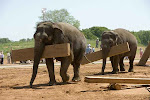1. Creeber, Glen (2003): The Television Genre Book. London, BFI Publishing.
"The influence of news on the way people think about the world has been a focus of media research for some time. There is now a body of evidence to suggest that the news is influential on public opinion in a range of specific and measurable ways." Page 110
This quote illustrates information on whether the news has a control over what people think about the ethnic minorities, and if whether it could contribute to the development of stereotypes.
"Most people would agree that news coverage should bear some relation to the importance of an event, but the definition of importance will vary depending on who we are and how we view the world." Page 110-111
This relates to my critical investigation as I will be investigating reasons as to why news stories concerning ethnic minorities have been published and if whether they are seen as important within society.
2. Casey, Bernadette. Casey, Neil. Calvert, Ben. French, Liam. Lewis, Justin (2002): Television Studies: The Key Concepts. London: Routledge.
"Today it is widely recognised that stereotypes are inaccurate, simplistic generalisations about a group of individuals that may lead to particular perceptions of the group by others." Page 229
This applies to my critical investigation as I will be investigating the media's role within the development of stereotypes, and to see if the media plays any part in it.
3. Morley, David (1992): Television Audiences and Cultural Studies. London: Routledge.
"Stereotypes have a complex relationship to reality. While stereotypes may be partial, they are not necessarily false: they generally control a grain of the truth." Page 230
This relates to my critical investigation as I can talk about whether the stereotypes could show truth as a result of them possibly relating to a person's real life situations.
"Television helps construct and perpetuate stereotypes." Page 230
Within my essay, I will be able to link the development of stereotypes to think quote as it till allow me to see if whether the media helps to develop the serotyped or reinforces them.
4. Williams, Kevin (2003): Understanding Media Theory. New York: Hodder Headline Group.
"Social change was explained by the struggle between competing and antagonistic forces in society. This struggle was between the 'haves' and 'have nots' who Marx differentiated in terms of their possession of economic power." Page 36
Marx stated that the 'haves' are the bourgeoisie (the capitalist owing class, which in this case is the media) and 'have nots' are the proletariat (the working classes or masses which in this case is the audience). By applying this theory of Marxism to my critical investigation, I can refer to this quote within my essay to explain if whether the media has a control over the audience's views, ideas, and opinions when it comes to what they think about the ethnic minorities.
5. Stevenson, Nicholas (1995): Understanding Media Cultures: Social Theory and Mass Communication. London: Sage.
"The media have been criticised for the generalised, partial and selective way in which they have represented different groups, emphasising easily identifiable, unchanging and often negative characteristics". Page 72
This quote puts into perspective the media's role within stereotyping and whether they reinforce them by showing a negative image of the ethnic minorities.
6. Corner, John (1995): Television: Cultural Form and Public Address. London: Arnold
"An audience gains their ideas about the stereotypical group from media sources, rather than from personal experience."
I will be able to see if the audience plays a passive role and just accepts what is being shown to them.
7. Laughey, Dan (2009): Media Studies Theories and Approaches. Harpenden, Herts: Kamera Books.
"The concept of moral panics originates from what is known as the 'labeling theory' which is premised on the ideas that people's actions are judged and labelled by the reactions of others." Page 101
This theory could contribute to the development of stereotypes where I can use this quote within my essay.
"News is always artificially constructed out of bits of reality." Page 103
In this case, news can be seen as just being a fabrication of real life events. I can use this quote to investigate reasons as to why news is produced and why some stories and published and televised.








No comments:
Post a Comment